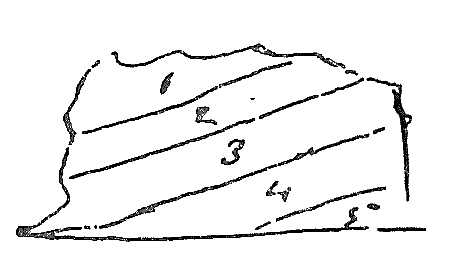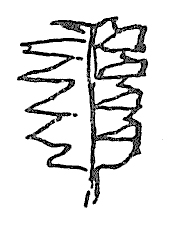From J. S. Henslow 15–21 January 1833
Cambridge
15 Jany 18321
My dear Darwin,
I shall begin a letter to you lest something or other should persuade me to defer it till it
becomes too late for the next packet— Wood & I had intended writing
by the Decr. packet, but just as was
about to do so your letter arrived stating that a Box was on its road,
so I thought I had better delay till I had seen its contents. It is now
here & every thing has travelled well. I shall however proceed by
rule & answer your two letters first & then come to the Box.
The 1st date of your first letter
is May 18. & this I received at Cambridge in June, no, it was
sent me from Cambridge in July, to Weymouth where I was spending the
summer with my family and two pupils in exploring the geology &c
&c of that neighbourhood, & a capable ramble we had. I stopped
at Oxford in my way there, where the British Association had assembled
for a weeks scientific discussion & a delightful time it was. Next
summer this society is to meet in Cambridge. When at Oxford I received a
letter from the Ld Chancellor giving me a
small living in Berksh: about 14 miles from Oxford. Of course I do
not reside, as I never mean to quit Cambridge without something very
extraordinary should happen.2 I never mean to
leave it for lucres sake. We returned to Cambridge in Octr. & have had the bustle of the Election
to go thru’. We could make nothing of any attempt to squeeze a Whig in
for the University so gave it up.3 We have got
2 Whigs for the town and 2 Whigs & one Tory for the
County— But the papers will tell you all this— At this moment I am
examiner in Paley & in one hour have to attend in the Senate house.
Now for a revision of your letters— I would not bother myself about
whether I were right or wrong in noting such & such facts about
Geology— note all that may
 be useful—most of all, the relative positions of rocks giving a
little sketch thus. No.1. (specimen (a))
about 10 feet thick, pretty uniform in character— No.2 (specim. (b.c)) variable &c
&c
be useful—most of all, the relative positions of rocks giving a
little sketch thus. No.1. (specimen (a))
about 10 feet thick, pretty uniform in character— No.2 (specim. (b.c)) variable &c
&c

|
this side is folded back at the edges |
Jany. 21. The Examn. is over & no Xts. man plucked— I don’t know whether you were acquainted with the men of this yr. (except Downes who is No. 26) or I wd send you their names— The Capt: is Laffer of Xts.—10 I have just been putting bye the perishable articles in the way I said— Birds —several have no labels— the best way is to tie the label to their legs— One has its tail feathers crumpled by being bent from bad packing—the rest in good order— Quad s. The large one capital, the 2 mice rather mouldy— Pack up an infinite quantity more of land & freshwater shells, they must be nearly all new— The minute Insects most excellent— what work you will have— You know better than I whether it is not dangerous to their antennæ & legs to pack them in cotton. I suppose if moistened by vapour they may be taken out quite safe.— The Lichens are good things as scarcely any one troubles himself to send them home— For goodness sake what is No. 22311 it looks like the remains of an electric explosion, a mere mass of soot—something very curious I daresay— Wd. it not be a good precautionary measure to transmit to England a copy of your memoranda, with your next packet? I know it is a dull job to copy out such matters—but it is highly expedient to avoid the chance of losing your notes by sending home a duplicate— Every individual specimen once arrived here becomes an object of great interest, & tho’ you were to send home 10 times as much as you do, yet when you arrive you will often think & wish how you might & had have sent home 100 times as much! things which seemed such rubbish—but now so valuable— However no one can possibly say you have not been active—& that your box is not capital. I shall not wait for Sedgwicks return before I send this but must give you an account of the Geolc. specs. in the next— I shall now forward this with the vol. of the Dict. Class. to your Brother & wish you a continuance of good success. I have no fears of your being tired of the expedition whilst you continue to meet with such as you have hitherto, & hope your spirits will not fail you in those dull moments which must occasionally intervene, during the progress of so long an undertaking. Downes & other friends have begged me to remember them to you most kindly & affectionately & Mrs Henslow adds her best wishes— Mine you well know are ever with you & I need not add that you sd believe me | Most affectly. & sincerely yrs. | J S Henslow
My 3 children are well—& my boy is growing a very fine fellow— An increase expected next June— We are in Mourning for Mrs Henslow’s Mother—
Footnotes
Bibliography
Cuvier, Georges. 1817a. Le règne animal distribué d’après son organisation, pour servir de base a l’histoire naturelle des animaux et d’introduction à l’anatomie comparée. 4 vols. Paris: Deterville.
Darwin and Henslow: Darwin and Henslow: the growth of an idea. Letters 1831–1860. Edited by Nora Barlow. London: John Murray. 1967.
Dod, Charles Roger. 1972. Electoral facts from 1832 to 1853 impartially stated … Edited with an introduction and bibliographical guide to electoral sources, 1832–1885., by H. J. Hanham. Brighton: Harvester Press.
Guilding, Lansdown. 1825. Description of a new species of Onchidium. [Read 4 November 1823.] Transactions of the Linnean Society of London 14: 322–4 and Tab. IX.
Summary
Acknowledges receipt of two letters from CD and a box of specimens.
Mentions attendance at BAAS meeting and a gift to him of a small living near Oxford. Some political news.
Congratulates CD on the work he has done – the specimens are of great interest. Gives advice on packing, labelling, and future collecting and suggests that – as a precaution – CD send home a copy of his notes on the specimens.
Letter details
- Letter no.
- DCP-LETT-196
- From
- John Stevens Henslow
- To
- Charles Robert Darwin
- Sent from
- Cambridge
- Source of text
- DAR 204: 111
- Physical description
- ALS 4pp
Please cite as
Darwin Correspondence Project, “Letter no. 196,” accessed on 18 April 2024, https://www.darwinproject.ac.uk/letter/?docId=letters/DCP-LETT-196.xml
Also published in The Correspondence of Charles Darwin, vol. 1


